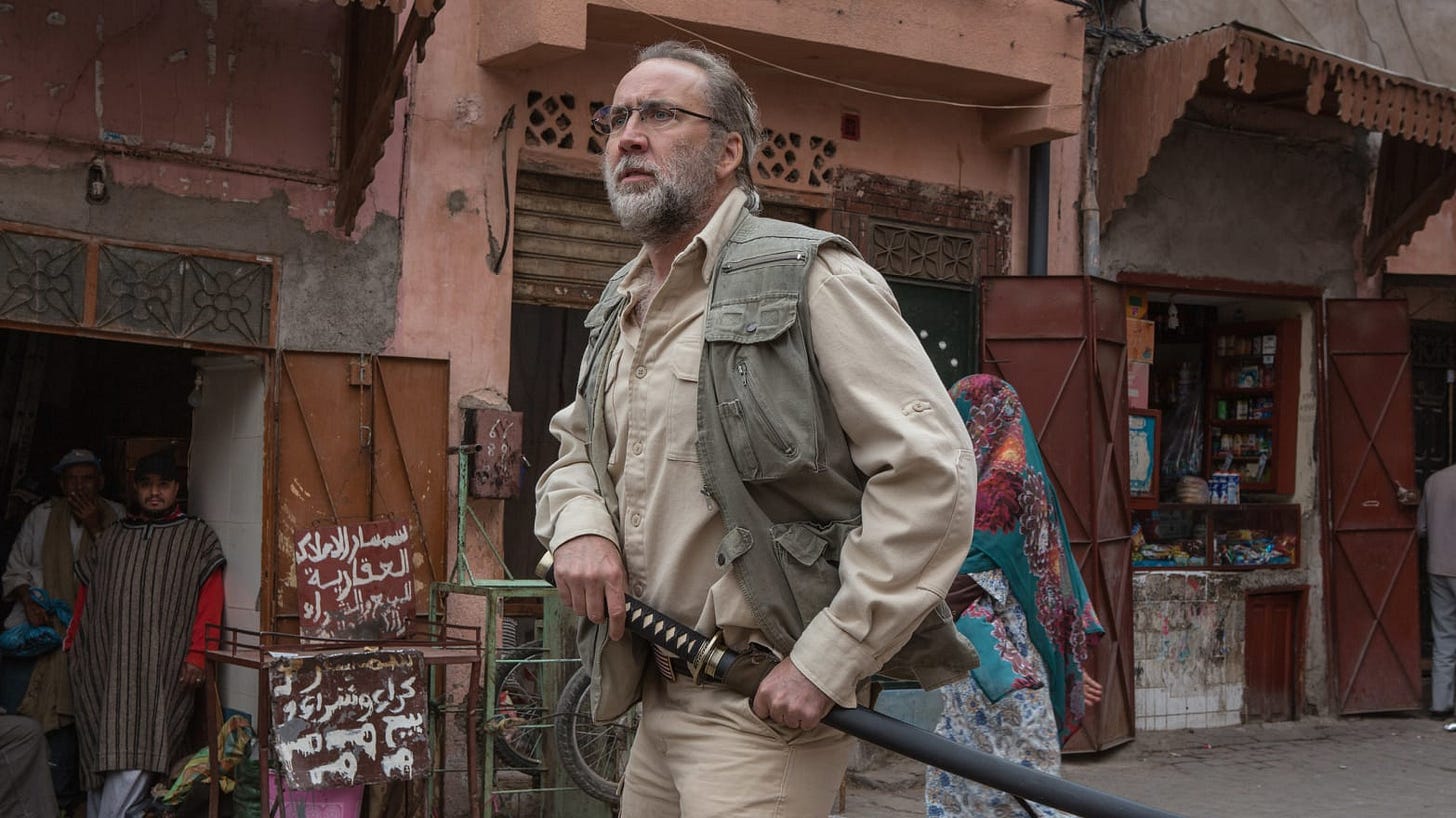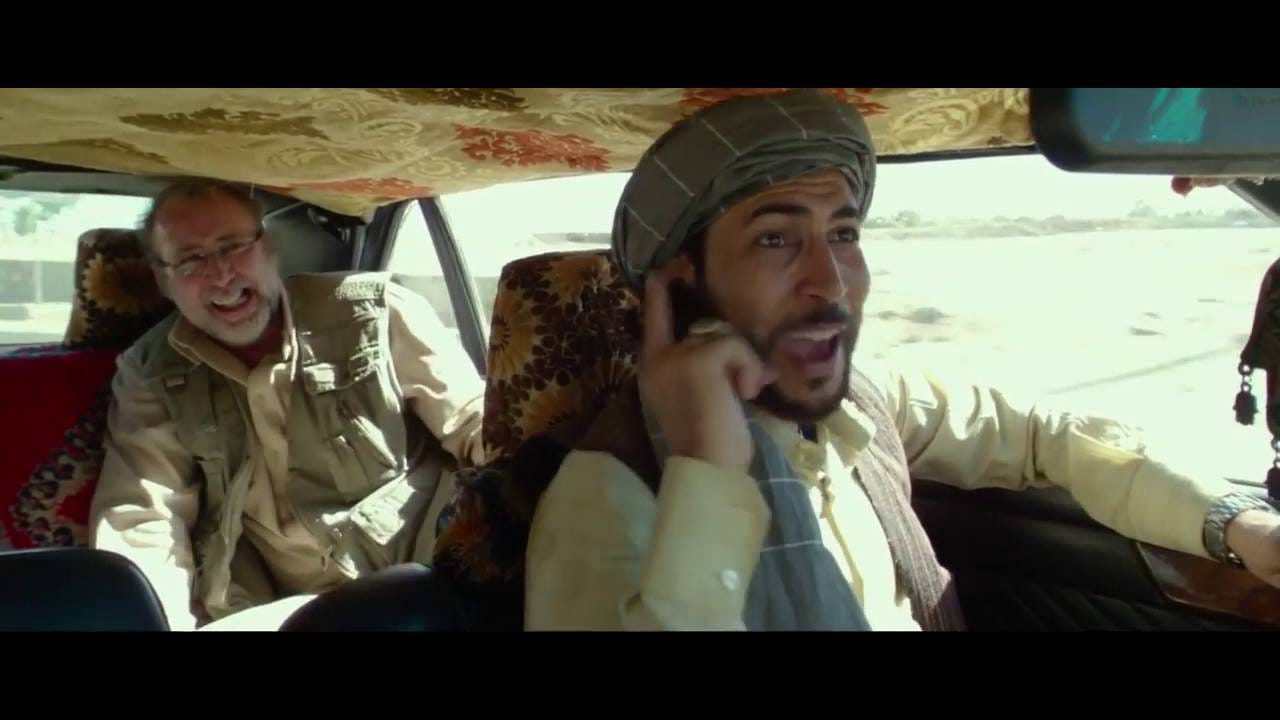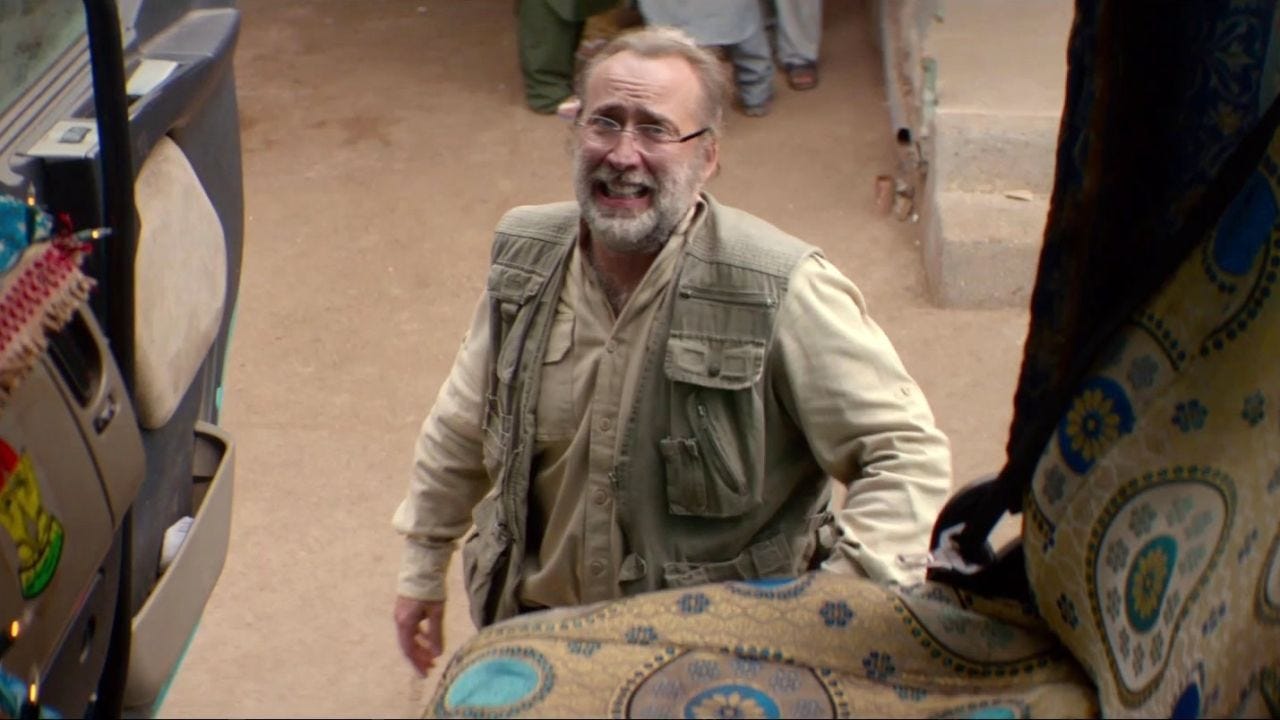I have a friend who has an unreasonably strong lust for Nicolas Cage, in every sense. I’m not entirely sure how she’d feel about him in the shaggy true story “Army Of One”, a political-seeming comedy with a Michael Dudikoff-level title. This is one of those movies where a single man considers himself a weapon of vengeance, even though he is anything but. This is not Cameron Poe-level Cage, but in fact a Cage I don’t think we’ve seen before – goofy, dimwitted, more than a little racist, and ill-equipped to wage the war he thinks he’s ready to start.
Cage here plays Gary Faulkner, a fidgety handyman from Middle America who is instantly grating to everyone around him. At the bar, he spins endless tall tales to patrons who grow bored. At work, he tests the patience of even the kindest passerby. And his flirtation with a neighbor played by Wendi McClendon-Covey is fueled entirely by corny Dad jokes and insights on life based on dull assumptions and white male cultural grievance.
Despite being a middle-aged shlub and an ex-con, Faulkner claims he’s the man for the job when, in 2004, he hears that Osama Bin Laden is hiding in the mountains of Pakistan. With no cultural knowledge of the region, but with a small clutch of weapons, Faulkner attempts to take a dinghy over the ocean to Pakistan. After that obvious failure, through more conventional means, he ends up visiting the region several times over, where he wanders aimlessly in search of the Taliban figurehead. He is guided by the voice, and sometimes the acerbic personage, of God, here played by Russell Brand, a casting choice I don’t think anyone on planet Earth needed.
Faulkner’s interactions in America and his conversations in Pakistan end up going… pretty much exactly the same. As in, he keeps talking, no matter the occasion, steamrolling people with his blathering as they allow him to run roughshod all over them with his gee-gosh Midwestern nonsense. A lot of this movie feels loose and improvisational, probably due to the influence of Larry Charles, a former “Seinfeld” writer who had previously directed a couple of Sacha Baron Cohen films, as well as the infamously slapdash Bob Dylan dramedy “Masked And Anonymous”. As Cage’s Faulkner holds court in Pakistan with bemused locals (not to mention concerned federal agents played by Rainn Wilson and Denis O’Hare), you wonder how many people he meets are actual actors versus untrained non-professionals.
Consistently, he refers to Bin Laden as ‘Binny Boy’, a humiliating sobriquet that nonetheless reveals how unserious his quest really is. It’s a reminder that everything you hear about Americans ready to mobilize for some sort of vigilante action, they’re more likely to be like this. Is there a difference between Gary Faulkner wandering through the Middle East with a samurai sword and the goons who were in Washington on January 6th? That was a violent and tragic day, but it’s likely the majority of them were imperialist dopes like Faulkner who thought their very presence was heroic, that they would be the ones to set the government right by interrupting the vote count so that, somehow, their President would be re-elected. The face of political extremism is, more often than not, the local idiot perceived by many as “harmless.”
No matter the case, this is impressive work by Cage. He’s created a character not unlike those dopey yokels you see nestled in a diner nook on morning shows, asked to share their thoughts on an economy they barely understand. Which is to say he is funny and likable and generally kind of a nuisance. You would want to throw him from your own moving vehicle, but you can see how others might be charmed by this doofus. It’s even more impressive when you take into account Cage’s career, and the amount of goofy shlubs he has played, in movies big and small. Has anyone played so many varying notes as an onscreen nobody? As much as we talk about Cage the nutcase, the MEGA-actor, the fact is he has played varying degrees of “irritatingly normal” through decades of different movies.
The movie, maybe intentionally, feels slight, very much like Faulkner’s own holy quest (he obviously never found Bin Laden). This is never more than just a goofy true human interest story with a quietly transformative performance at the center. Maybe there’s more to it, somewhere – as was common back then (2016), it’s alleged that the Weinsteins recut and re-edited the film, though it feels small and snug as is – what kind of extra fat could have been trimmed? Was it broader before? There’s a lot of Cage in the final version, but is it possible there was less of him in an earlier cut? It’s hard to imagine, when watching this movie, that we missed out on some radically different vision. Faulkner is still alive – maybe we should send him out on the quest to locate that excised footage.
Faulkner’s greatest crime is ultimately his absurd delusions of grandeur. Cage makes this blowhard likable, but in real life Faulkner must be intolerable (if this was him during the Bush years, he must have been a nightmare during the Trump era). It’s a collective delusion I know all too well. The difficulty in day-to-day activities in prison is that you have no reactions, no sounding boards. You retreat inwards, because there is no one and nothing to offer a comparison point for your thoughts and actions. You truly must create your own worth, in an environment designed to belittle and diminish your sense of self.
The aim is to emerge from this with a healthy self-esteem and a realistic sense of who you are. But it’s difficult to get there, and I watched several men surrender to these delusions. These are men who have either grown estranged from their families or they don’t have ones. And so they have designed each day to be a testament to their infallibility. I met with many of these men on a day to day basis since several of them were taking the time to work on creative projects. People have told me to write a book about my prison experiences, but I don’t feel like I should consider this given that EVERYONE in prison thinks they have a book in them, and their own personal journey is interesting to just about any layman.
I had to read so many manuscripts and screenplays about people chronicling their own lives. I encouraged them to keep going, to try new things. But I tried to temper their discussions about massive worldwide sales or ticket receipts or sponsorships with constructive criticism. One finance criminal I knew penned a 400 page screenplay that served as a factual account of the crimes somehow pinned on him, a script ending with everyone in his life apologizing to him for mistreating him, including his father who had returned from the afterlife specifically for that occasion. Another was drafting a book about how to properly invest using financial information as well as pseudoscience, a book that expanded to be about the scourge of woke culture (of which he knew not much, given that he was incarcerated during that period) and COVID protocol. A rapper insisted he could go platinum by rapping over the prison phone, but kept raging against my advice to actually sign a written contract beforehand, certain that this was the path to success. I saw a young man conceive of a highly unhealthy food product for children mixing candy and vegetables, despite no knowledge of cooking or ingredients, certain that was the best path. I knew of men who wanted to get out to start a GoFundMe for the sole purpose of making money, without producing anything of value. These were plans built out of the delusions of ego, ego that forms in dire circumstances like prison, where no one is offering any sense of mindfulness or therapy. This only emerges out of incarceration. You won’t see a lot of this if we just attempted some form of restorative justice.








It's such a funny premise. Too bad they, apparently, messed it up, but I don't doubt that Cage is actually committed and good in the lead. That said, I won't see myself watching this probably ever.